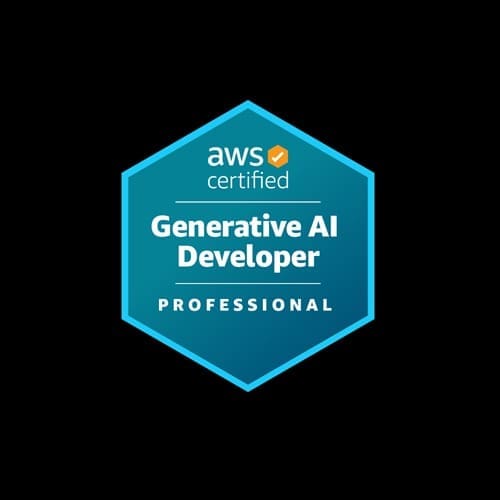AWS has officially announced its newest addition to the certification family — AWS Certified Generative AI Developer – Professional, with the beta exam opening November 18, 2025.
This professional-level certification validates advanced technical expertise in building and deploying production-ready generative AI solutions on AWS, particularly using Amazon Bedrock and related services. It’s designed for experienced developers who are ready to move beyond experimentation and prove they can deliver secure, scalable, and cost-efficient AI systems that drive real business results.
⸻
Why This Certification Matters
Generative AI is reshaping software development and solution design across industries. As organizations look to integrate AI into existing applications and workflows, demand for engineers who can translate large-language-model capabilities into production architectures is accelerating.
According to the Wall Street Journal, one in four technology jobs now requires AI skills — and AWS’s new certification directly aligns with that market shift. Rather than creating niche AI titles, companies are looking for cloud professionals who can embed AI responsibly and securely within existing stacks.
This certification fills that need. It validates that you can:
- Design and deploy generative AI applications using AWS Bedrock and open-source tools.
- Implement secure identity and access controls aligned to AWS best practices.
- Apply infrastructure-as-code, monitoring, and cost-optimization strategies for scalable inference workloads.
- Deliver production-grade models that move beyond proof-of-concepts into measurable outcomes.
⸻
Who Should Pursue It
AWS recommends that candidates have:
- 2+ years of cloud experience developing production applications on AWS or open-source stacks.
- 1 year of hands-on experience implementing generative AI solutions.
- Familiarity with core AWS services (compute, storage, networking, IAM, observability, IaC, and cost optimization).
While no prior certifications are required, AWS notes that earning one or more of the following may provide a strong foundation:
- AWS Certified AI Practitioner
- AWS Certified Solutions Architect – Associate
- AWS Certified Machine Learning Engineer – Associate
- AWS Certified Data Engineer – Associate
⸻
What This Means for Developers and Employers
For developers, this certification represents a significant opportunity to demonstrate mastery at the intersection of cloud infrastructure and generative AI — a combination increasingly sought after by employers across sectors from fintech to manufacturing.
For organizations, it offers a trustworthy benchmark to identify professionals capable of designing production-ready AI systems, managing cost efficiency, and ensuring data security and compliance — critical as AI workloads scale.
⸻
Preparing for the Beta
The beta exam begins November 18, 2025, and seats typically fill fast. As with other AWS beta certifications, participants can expect a discounted registration fee and the opportunity to be among the first globally certified in generative AI development once the exam is released.
At Learn Flourish LLC, I’ll be developing dedicated training materials and live courses aligned to this new certification, blending deep AWS architectural understanding with real-world MLOps and Bedrock integration labs.
If your team is preparing to integrate AI into your workflows — or if you’re an individual developer ready to specialize in production-grade AI systems — this certification is the next step.
⸻
Learn Flourish: Bringing High Tech Down to Earth
Learn Flourish LLC provides cloud and AI certification training designed for working professionals and organizations adopting AWS at scale. As an AWS educator, course developer, and author of multiple certification practice resources, I’m committed to helping professionals build confidence and credibility in the cloud era.
Stay tuned — a full AWS Generative AI Developer – Professional study guide and instructor-led beta preparation course will launch here soon.
Visit the AWS Certification Page




